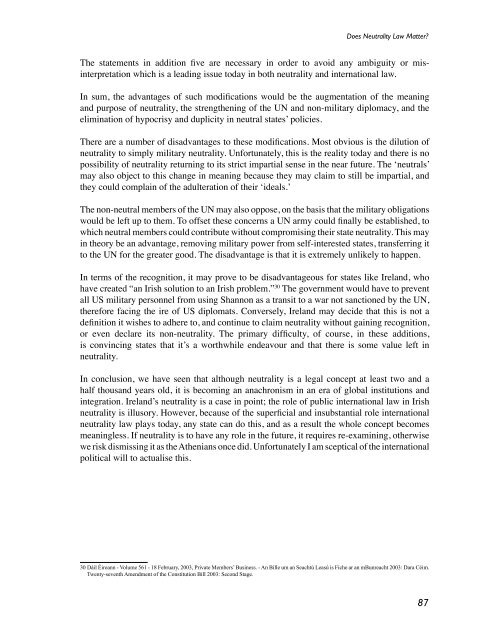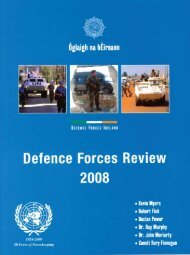Defence Forces Review 2010
Defence Forces Review 2010
Defence Forces Review 2010
You also want an ePaper? Increase the reach of your titles
YUMPU automatically turns print PDFs into web optimized ePapers that Google loves.
Does Neutrality Law Matter?The statements in addition five are necessary in order to avoid any ambiguity or misinterpretationwhich is a leading issue today in both neutrality and international law.In sum, the advantages of such modifications would be the augmentation of the meaningand purpose of neutrality, the strengthening of the UN and non-military diplomacy, and theelimination of hypocrisy and duplicity in neutral states’ policies.There are a number of disadvantages to these modifications. Most obvious is the dilution ofneutrality to simply military neutrality. Unfortunately, this is the reality today and there is nopossibility of neutrality returning to its strict impartial sense in the near future. The ‘neutrals’may also object to this change in meaning because they may claim to still be impartial, andthey could complain of the adulteration of their ‘ideals.’The non-neutral members of the UN may also oppose, on the basis that the military obligationswould be left up to them. To offset these concerns a UN army could finally be established, towhich neutral members could contribute without compromising their state neutrality. This mayin theory be an advantage, removing military power from self-interested states, transferring itto the UN for the greater good. The disadvantage is that it is extremely unlikely to happen.In terms of the recognition, it may prove to be disadvantageous for states like Ireland, whohave created “an Irish solution to an Irish problem.” 30 The government would have to preventall US military personnel from using Shannon as a transit to a war not sanctioned by the UN,therefore facing the ire of US diplomats. Conversely, Ireland may decide that this is not adefinition it wishes to adhere to, and continue to claim neutrality without gaining recognition,or even declare its non-neutrality. The primary difficulty, of course, in these additions,is convincing states that it’s a worthwhile endeavour and that there is some value left inneutrality.In conclusion, we have seen that although neutrality is a legal concept at least two and ahalf thousand years old, it is becoming an anachronism in an era of global institutions andintegration. Ireland’s neutrality is a case in point; the role of public international law in Irishneutrality is illusory. However, because of the superficial and insubstantial role internationalneutrality law plays today, any state can do this, and as a result the whole concept becomesmeaningless. If neutrality is to have any role in the future, it requires re-examining, otherwisewe risk dismissing it as the Athenians once did. Unfortunately I am sceptical of the internationalpolitical will to actualise this.30 Dáil Éireann - Volume 561 - 18 February, 2003, Private Members’ Business. - An Bille um an Seachtú Leasú is Fiche ar an mBunreacht 2003: Dara Céim.Twenty-seventh Amendment of the Constitution Bill 2003: Second Stage.87
















